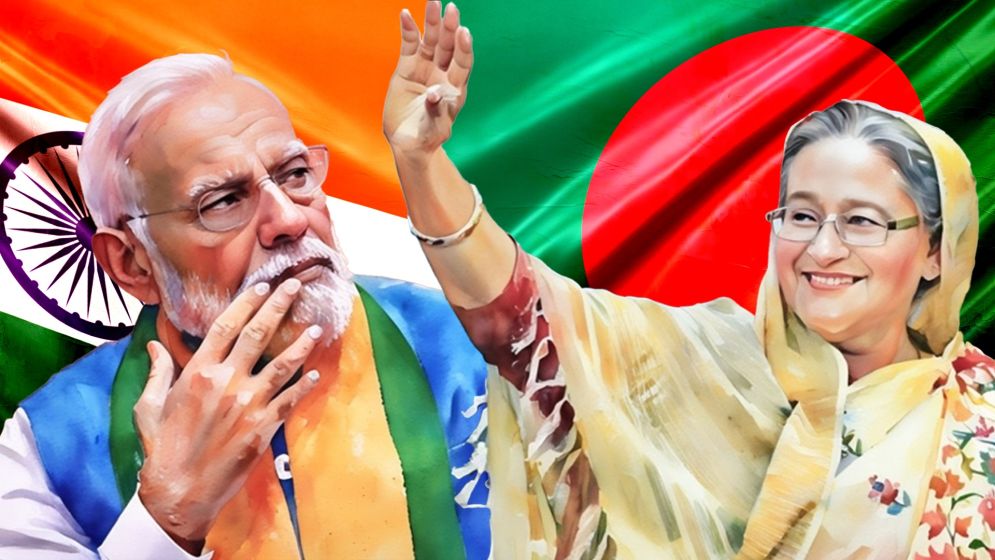Without a Teesta deal, any bilateral state visit to India would be pointless for Bangladesh

State visits typically entail reciprocity, yet there is a notable indifference in Dhaka concerning Prime Minister Sheikh Hasina's visit to India today.
In contrast, New Delhi is seemingly filled with enthusiasm, despite Prime Minister Narendra Modi's narrow victory margin in the recent election.
It doesn't take a neutral observer long to discern which side anticipates giving less and receiving more during this visit. However, determining who will ultimately achieve this is a separate issue.
Numerous agreements, investments, memorandums of understanding, and joint statements are on the agenda. However, what Dhaka seeks to gain from Delhi is conspicuously absent.
A comprehensive Teesta water-sharing agreement will not be signed during this visit.
India’s smoke and mirror diplomacy
While New Delhi may publicly portray its relationship with Bangladesh in altruistic terms, the reality is that any bilateral relationship between sovereign nations is driven by self-interest.

During the last one decade, Dhaka has
fulfilled many of Delhi's requests. First and foremost it has helped reduce
India’s security threat in the northeastern states.
Bangladesh has extradited prominent leaders of the United Liberation Front of Assam, made the country unwelcoming to pro-independence insurgent groups, particularly those from Assam, and allowed transit for Indian goods through its territory.
New Delhi meanwhile has successfully established a defense agreement with Dhaka that primarily safeguards India's interests in the region.
Additionally, India has increased its exports to Bangladesh, including selling electricity at a premium, even though Bangladesh may not have a pressing need for it.
On the other hand, Bangladesh's main grievance is that Delhi has not reciprocated on Dhaka's top priority: the Teesta river water-sharing agreement.
India also hasn’t addressed another thorny issue of border killing.
Despite any historical narratives promoted by India, the undeniable truth is that Bangladeshi citizens are being killed by Indian Border Security Forces at an alarming rate, exceeding most international borders, including the Indo-Pakistan border.
Furthermore, there is a growing "Anti-India" campaign underway in Bangladesh, which has already impacted India's $12 billion export basket to the country.
The campaign, led by influential Bangladeshi social media activists, began with the assertion that New Delhi had exerted considerable effort to ensure Hasina remained in power through three successive disputed elections.
It is true that New Delhi supported Hasina steadfastly even as criticism against her peaked in Western capitals before the elections.
India took the initiative to engage with the US on Hasina's behalf, successfully arranging a meeting between her and US President Joe Biden at the G20 summit in New Delhi.
The Modi government also reportedly articulated a compelling argument to the US, emphasizing the critical role of the Hasina government not only for Indian security interests but also for broader US strategic priorities in the Indo-Pacific region.
The ordinary citizens of Bangladesh, who have observed three consecutive elections marred by restricted voting rights and democratic norms, view this as an unwelcome interference from India.
The presence of a right-wing leader such as Modi at the helm of New Delhi, who has effectively marginalized nearly 200 million Muslims in India, further stoked resentment among the general populace in Bangladesh and intensified the anti-India sentiment.
Interestingly, for the last couple of years, Bharatiya Janata Party leaders, including Prime Minister Modi, frequently invoke the image of large numbers of "illegal Bangladeshis" entering Indian territory, using it as a veiled reference to the increasing Muslim population in the eastern border states.
This rhetoric proved effective for the BJP in consolidating Hindu votes during the 2019 Lok Sabha elections but somewhat misfired this year.
Sino-Indian rivalry in context
Dhaka, under Hasina’s leadership, accepts the whole situation with India with minimal complaint due to its geopolitical and economic constraints, although opposition factions in Dhaka would prefer to blame the "special relationship" between the ruling Awami League and Delhi.

While it's true that the Awami League
maintains a non-adversarial stance towards Delhi, it operates within the
practical limitations of governing a country that is geographically surrounded
and physically separated by barbed-wire fences erected by India and faces a
significant trade deficit with India, including essential goods.
Such a situation is undesirable for any sovereign nation, making it crucial to diversify relations with other countries. This is particularly important when the most significant regional power–China– implicitly views Bangladesh as part of its sphere of influence.
During the decade and a half long regime of Hasina, Bangladesh has strengthened its ties with China, which offers significant financial investment in infrastructure and other areas of mutual interest that India cannot match.
Just to put it into context, within weeks of a bilateral visit to Delhi, Hasina has scheduled another bilateral trip to Beijing in the first week of July.
The perceived Sino-Indian rivalry is primarily a concern from Delhi's perspective though. Beijing's viewpoint on this matter probably aligns best with a quote of Coco Chanel: "I don't care what you think of me. I don't think of you at all."
But Beijing obviously cannot offer a Teesta water-sharing agreement, Delhi can. It would be a significant achievement for the Hasina regime to present to its people a long-coveted agreement on Teesta water.
So, if Delhi really wants to compete with or surpass Beijing in gaining Bangladesh’s general people’s favor, it must offer a Teesta deal.
The ball is in their court.
—

